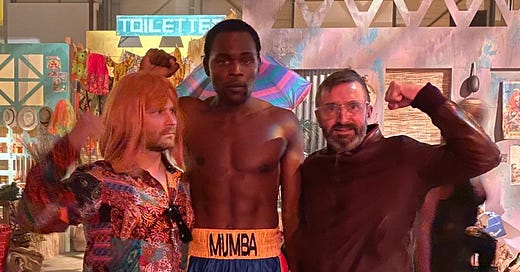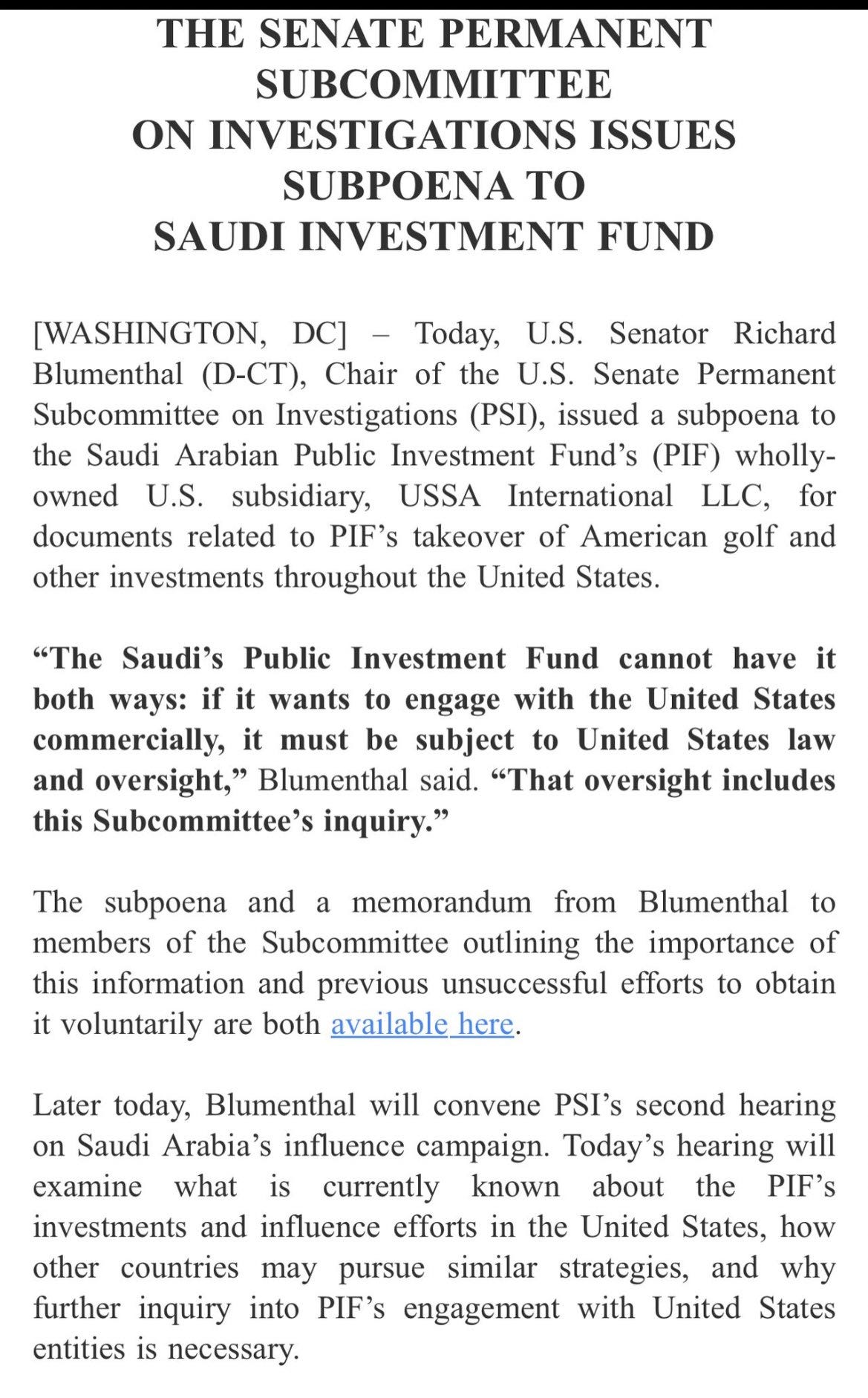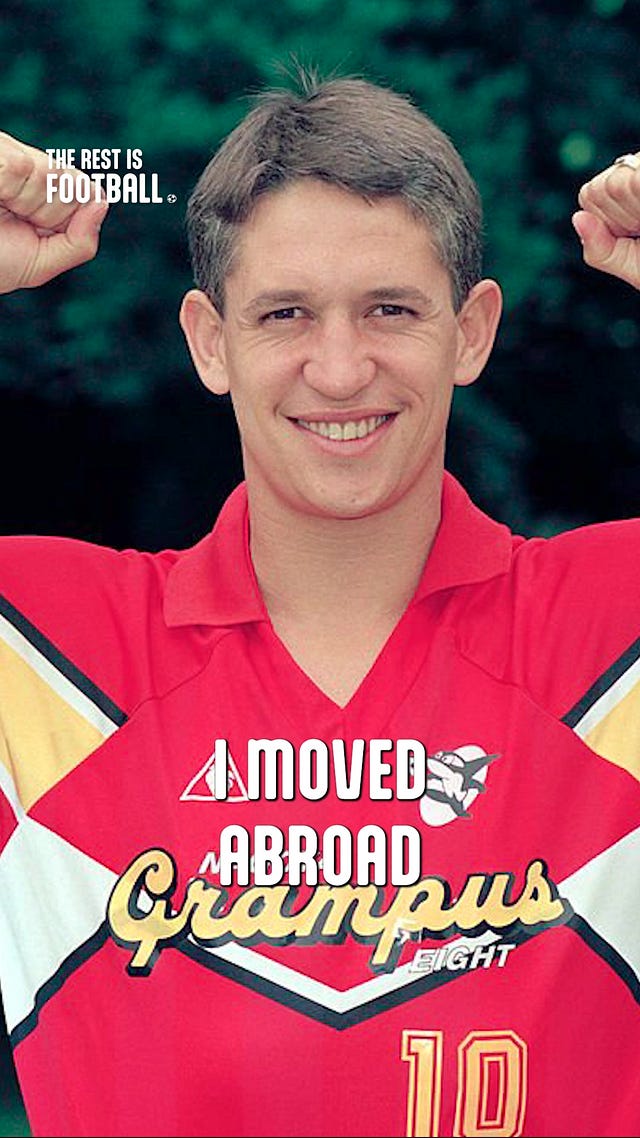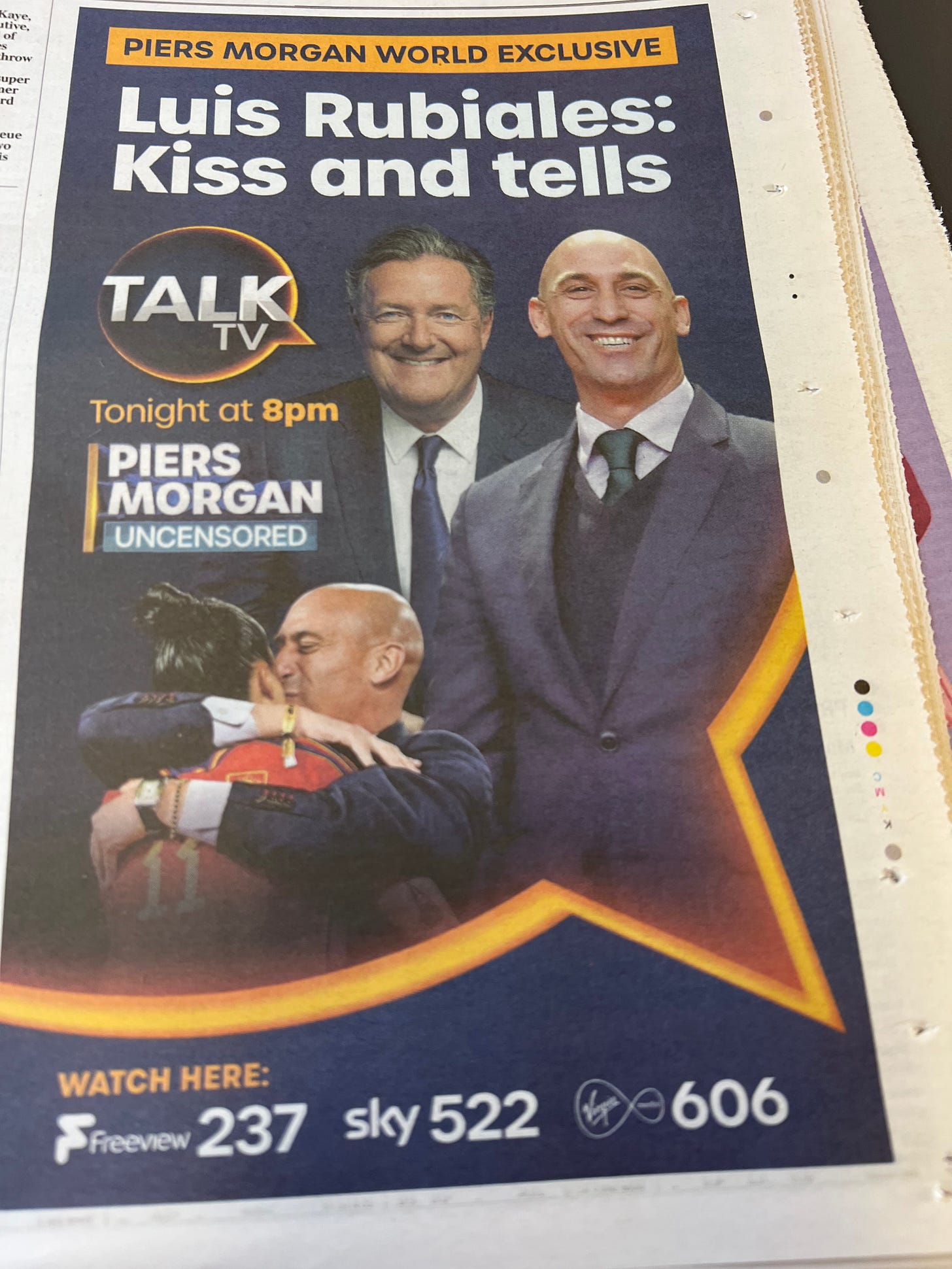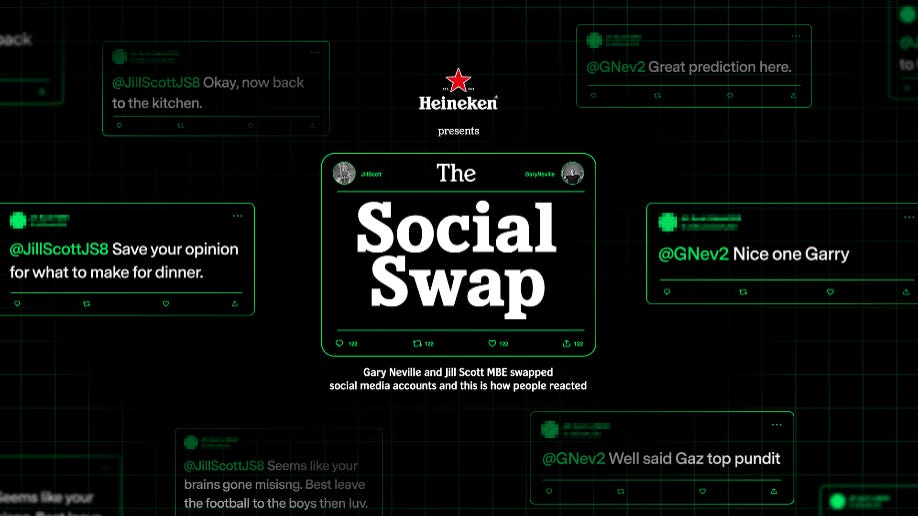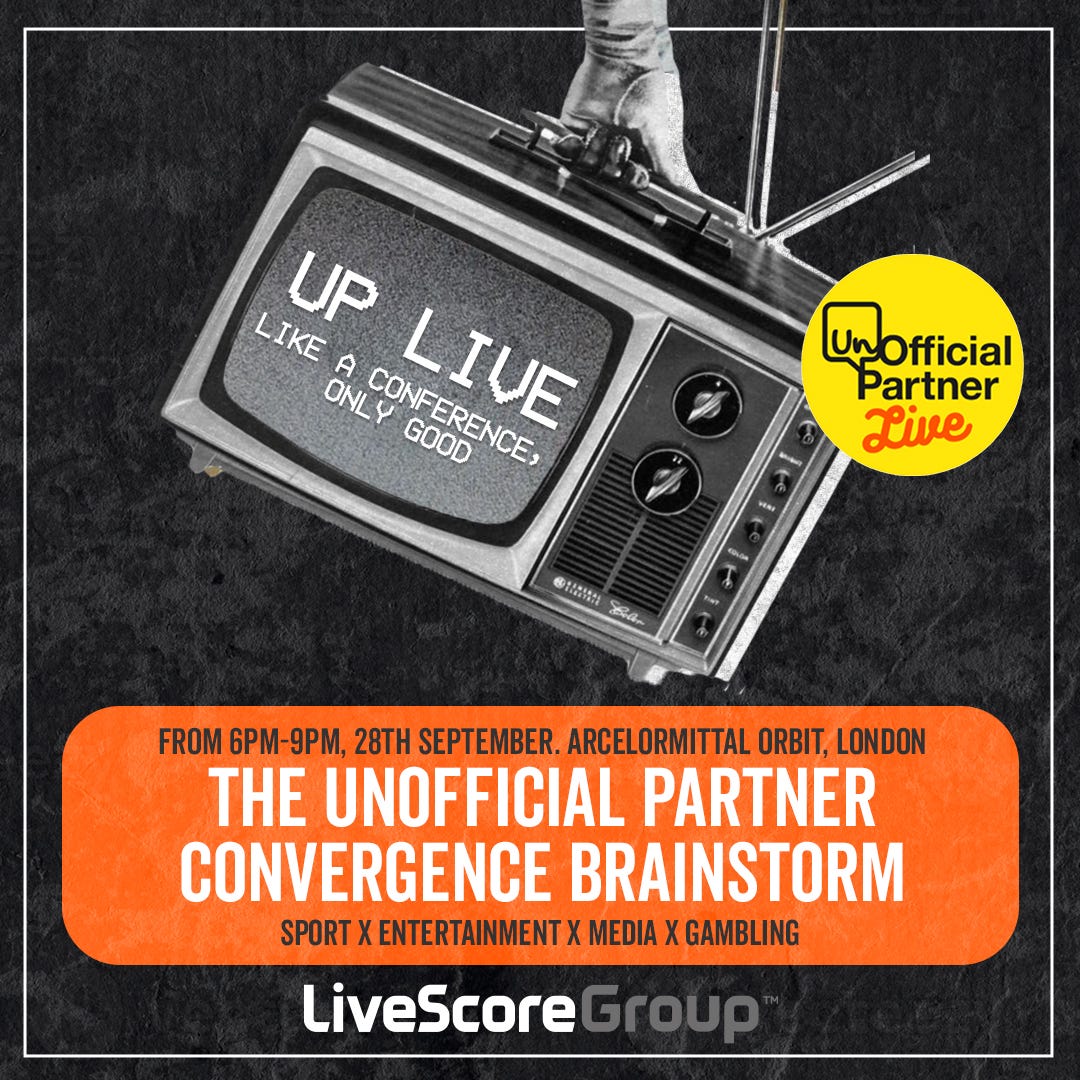That Ari Emanuel Podcast; What is ESPN now; The Mark Oliver Conundrum; PIF takes; Gotcha's getting tired; CAA, from Tiffany to Walmart; Leaders Week x UP; Lineker on semi-retirement; Patient 1
Overthinking the sports business, for money
See you at Leaders Week London
This week’s newsletter is sponsored by our mates at Leaders Week London.
This year’s event takes place from 16th to 19th October, with the two day Leaders Summit held at Twickenham Stadium on Wednesday 18th and Thursday 19th.
There's going to be three stages to visit: the Headline Stage, the brand new Creative Stage and the Tech and Innovation Stage.
You'll have the chance to hear from the likes of Disney, FIFA, Coca-Cola, Universal Music Group, Manchester United and many more.
Use UP15 for a 15% discount on your Summit passes - visit leadersinsport.com/UP for more information.
ESPN sneezes, sport gets flu
The blackout battle between cable giant Charter Communications and Disney is over.
Now the fun starts.
This is a good explainer, by Daniel Kaplan.
What does it mean for the future of cable, which is held together by sports and news like threadbare twine keeping a cardboard box intact? Is it good news for the NBA and its looming media package? And it goes without saying, but we’ll say it, the transaction coming on the eve of the first Monday Night Football game of the season highlighted aggressively the value of the NFL.
Stand out quote from William Mao of Octagon
“The big takeaway for me is that the sky is not falling, the TV ecosystem is not dead.”
There’s quite a bit of hope in that statement.
By contrast, Ben Thompson’s conclusion should send a chill across every sports front office.
This is from a long read, The Rise and Fall of ESPN’s Leverage:
Thompson’s Stratechery is the tech newsletter GOAT.
Here he is on a podcast, talking ESPN and Charter.
‘Joined up consulting’ v Death by McKinsey
Building on the above storyline, Mark Oliver is plotting for a present/near future of faltering traditional media rights fee income growth in many developing markets and the changing tastes and needs of Generation Z (and Alpha) means that every sports organization is reviewing what they do and how they do it.
These responses come down to deciding what to do in four interrelated areas –
(i) Expanding or deepening the fan relationship – from avid fans to the casual fan;
(ii) Getting the proposition right – from the overall calendar to individual leagues and events;
(iii) Optimizing monetization – from B2B or D2C media income to sponsorship relationships, data exploitation, event hosting fees, ticketing, and e-commerce;
(iv) Sustaining and growing the whole complex ecosystem from participation levels to elite athlete/player development to team finances, to competition development – and bringing all the key stakeholders along with any plan.
Niche specialist sports consultancies have grown up around each of the above pain points.
But working on each problem in isolation isn’t helpful.
And the Boston, McKinsey type big corporate consultancies are not the answer either, offering boringly generic solutions to nuanced challenges.
So, stuck in the middle.
Patient 1 - Golf
LIV Golf is a case study in what I'm now calling The Mark Oliver Conundrum.
A sport-by-numbers answer to the four problems outlined above.
But it’s shit.
(Note: LIV Golf started at McKinsey according to our conversation with Sean Bratches).
And has left professional golf ever more fractured and fans confused and irritated.
Things of value - the Ryder Cup for example - have been imperilled.
And the fall out could last years.
This week PIF were called to appear in front of the beak.
Worth noting what Ari Emanuel said on the Freakonomics podcast:
“You know, we got a call. We got a call, like, from [Bryson] DeChambeau and Phil [Mickelson]. ‘Hey, do you want to finance this?'” — instead of the Saudis, Emanuel recalled. “I said to Egon, ‘Yeah.’ I said we would put up — meaning Endeavor — would put up $1 billion.” Egon Durban is chairman of the board of Endeavor and is co-CEO of its largest shareholder, private equity firm Silver Lake. “Egon then called somebody at the PGA. And, you know, we’re all connected in golf. And they said, “Please don’t do it.” So we stopped.”
Emanuel said he is friends with PGA Tour Commissioner Jay Monahan and does a lot of business with him, so didn’t want to inflict undue injury. “But I just thought, you know, I’m always looking for the next sport, the next thing we can do,” he said. “So we pulled out. I said to Jay, ‘Jay, we’re pulling out. But you have got to figure out an economic solution here because it’s going to force you.’ And he did.”
Again, to Oliver’s central point about interdependence.
Everything’s connected, all of the time.
LIV Golf is important because a version will likely emerge in every sport, if it hasn’t already.
Some of these will feel exciting and necessary. Others just greedy and clumsy.
But each sport will be faced with the fall out.
Fwiw, I’ve got time for Lawrence Donegan’s analysis:
Prediction: the PGAT/PIF "deal" will never be consumated. In its place - a new for-profit PGAT entity backed by US-based media investors (Endeavor, Silver Lake, whoever.) Saudi involvement will amount to something like the LPGA's Aramco series.
From Tiffany to Walmart
From the same Emanuel interview, this zinger is timely, given CAA’s sale this week.
“Remember, they were the biggest agents — [CAA co-founder] Mike Ovitz gave them everything. They had, for lack of a better metaphor, Tiffany. And you know what they did with it? And I think Walmart’s a great company. But let’s just say they made it Walmart.”
CAA’s new ownership adds a another layer to the Tiffany reference.
François-Henri Pinault is the CEO of fashion firm Kering and the billionaire scion of a French luxury goods fortune.
Pinault (whose wife, Salma Hayek Pinault, is a CAA client) will keep the agency privately held. The other holdings of Artémis include Kering, the luxury goods group that owns Gucci, Saint Laurent, Bottega Veneta, Balenciaga and Alexander McQueen; the auction house Christie’s; a series of wine estates; and a contemporary art collection.
The majority stake sale of CAA marks the biggest acquisition in Hollywood’s representation space since WME unveiled a $2.4 billion bid for the fashion-focused IMG in 2013, a year after private equity firm Silver Lake Partners invested in the Ari Emanuel-run agency.
Hear the full conversation here. It’s good.
PIF Takes
One more thing from that Emanuel pod.
Another connection.
This time on the emerging role of Saudi Arabia.
MBS invested in Endeavour.
This investment was paid back - $400million plus interest - following the state-sanctioned murder of dissident journalist Jamal Khashoggi at the Saudi consulate in Istanbul.
EMANUEL: He’s incredible. I mean, he is as charming as could be. He had this whole vision, bringing entertainment and movies back. And he wanted to spend $30 billion in entertainment. Well, I can do math. $30 billion. I mean, it’s money. And I thought his vision was incredible. So we negotiated. It took about nine months of negotiation for them to invest. I think it was $400 million. And then, you know, I think a bad thing happened. But let’s be very clear about something. I’m not defending what they did. You know, I’ve had a brother that’s been in two White Houses. Every country does bad things. They just don’t do it in an embassy. Right or wrong, we killed an American citizen who was a terrorist, with no trial, from a drone during the Obama administration, actually. Right? He was an American. He was a terrorist. No trial.
Emanuel is referring to the 2011 drone strike in Yemen that killed Anwar al-Awlaki, an al-Qaeda leader born in New Mexico.
Saudi’s other problem
Any conversation about Saudi’s role in sport starts with the obvious question - is it right?
Where are you on the sports washing question?
Are you ok with it, ethically. Personally.
What is the story you tell yourself? That you’re on the side of the reformers against the hardliners; MBS on a hope poster, the right side of history.
You’re not a useful idiot.
That’s the biggie. And we’ll all make our own decisions.
But let’s park that one for a moment.
There’s another, lesser question.
Which is about quality.
Will the big Saudi sports investment projects ever be good enough?
By this I mean, good enough to be culturally relevant.
To matter.
Which is sort of the point of the exercise.
LIV fails this test. Despite the price tag.
So too does the Saudi Premier League.
Note Lineker’s ‘semi retirement’ point about Jordan Henderson in this clip.
The running assumption is that the limitless money will take care of quality, eventually.
Maybe it will.
But in Saudi’s two biggest moves - golf and football - the question remains open.
The medium is the message
Marshall McLuhan was a clever bastard, part 23.
Where else would Rubiales choose to ‘Kiss and tell’ (ffs).
Caption Competition
UP co-founder Sean Singleton, below right, was last seen at the premiere of Rumble in the Jungle Rematch in London’s Docklands.
The women’s football gotcha is getting tired
You’ll recall the Orange ad around the Women’s World Cup, the one with the switcheroo - ‘Ha, you see, it was the women all along’.
Heineken, via Edelman PR, have repeated the joke, swapping the Twitter punditry of Gary Neville with that of Jill Scott.
The rug pull is then revealed, with predictable results.
Spoiler: There’s some really stupid men out there, some of whom have laptops.
It’s a gotcha, only without the surprise element.
Which poses the question, what’s the point?
Hopefully, creative shops will soon tire of using this trope to promote women’s football and move to, you know, actually promoting women’s football, without referencing men.
See also: The recent Big Idea dissected the creative ideas around the FIFA Women’s World Cup.
See also, today’s Women’s Sport Trust research suggests average time spent watching has increased by 28% and total viewing hours increasing by 19%, year on year.

